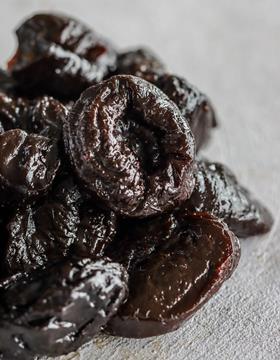
Researchers from the University of Liverpool have published a two-part study demonstrating how the inclusion of prunes in a structured weight management programme - in place of usual snacks - is compatible with weight loss.
With recent statistics revealing that nearly two-thirds of adults in England are now an unhealthy weight, the results of the studies have been welcomed by the California Prune Board (CPB), who have long championed the health and nutritional benefits of California Prunes as a snack.
The research was carried out by Dr Jo Harrold and colleagues from the University of Liverpool. The first phase of the study explored the impact of dried fruits (prunes and raisins) on appetite, while the second phase researched whether prunes undermined weight loss when eaten as a snack as part of a structured weight loss programme. Findings also revealed that the group who consumed prunes experienced greater levels of satisfaction, convenience, and ease of keeping to the programme compared with the active weight management group without prunes.
Professor Jason C G Halford, now of the University of Leeds and president of the European Association for the Study of Obesity (EASO), was part of the study team. He says of the findings: “These studies demonstrate that dried fruit can both produce satiety and be incorporated into diet during weight management.”
The research is also contrary to previous advice given to exclude or limit dried fruit for weight loss. Esther Ritson-Elliott, director of international marketing and communications for the CPB, says: “This study helps to redress the perception that dried fruit provides more calories than fresh fruit and as such may be detrimental for weight management. In fact, the energy content per individual fruit piece remains the same between dried and fresh fruit.”
Ritson-Elliot concludes: “The California Prune Board is delighted with the findings, which demonstrate how prunes can be used to aid weight management, and contribute to feelings of satiety, as part of a healthy diet and lifestyle. With supply chains disruptions still ongoing, prunes are a great, shelf-stable alternative to fresh fruit, and can be kept in the cupboard for up to a year. They are also a tasty, convenient and portable snack for those looking to make improvements to their diet and lifestyle.”
The research was funded by USDA Foreign Agricultural Service (FAS) and contributions from the California Prune Board and the Californian Raisin Administrative Committee. The funders were not involved in the drafting or content of the manuscript.



